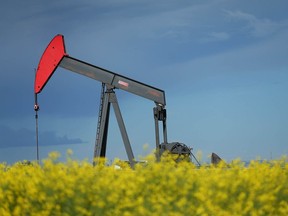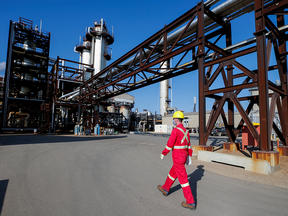
[ad_1]
UCP Leader Danielle Smith began her first official campaign announcement this month in front of a home in Calgary’s southern suburbs, pledging to cut personal taxes and continue Alberta’s economic recovery.
“Alberta’s economy is booming,” she said at the event in Auburn Bay.
“We’re going to be relentlessly focused on jobs and economy and investment and bringing people here.”
On Monday, Smith’s message of economic continuity helped propel the United Conservative Party to its second consecutive majority government, defeating Rachel Notley’s NDP.
Aside from Smith’s promise to create a new eight per cent tax bracket on income earned under $60,000 a year, she also vowed during the 28-day race to continue balancing the province’s budget books.
A theme of economic stability proved attractive for a province that’s come through several lean years following the initial collapse of oil prices nine years ago, thousands of layoffs, and then the pandemic.
Yet, with the new tax cut costing the treasury an estimated $1 billion, and other promises — such as extending the 13-cent-a-litre gasoline tax holiday through the year — an immediate challenge for the next finance minister will be to keep the province in surplus territory.
Smith will also need to forge a plan to position the province for longer-term growth, investment and jobs amid an evolving economy.
Recommended from Editorial
-

Q&A: As Alberta energy sector transforms, Danielle Smith weighs in on industry’s future
-

Alberta Election 2023: UCP to win majority
-

Alberta election: UCP wins battleground Calgary en route to re-election, NDP makes inroads
Back in February, under Smith’s first budget as premier, the province projected U.S. benchmark oil prices would average US$79 a barrel through this fiscal year.
On Monday, prices for West Texas Intermediate (WTI) crude closed nearly $6-a-barrel below that mark.
On the revenue front, every $1-a-barrel change in the price of WTI oil over the course of the budget year alters provincial revenues by $630 million.
“There’s not a lot of margin to manoeuvre,” Alberta Central chief economist Charles St-Arnaud said Monday.
The budget forecast a $2.4-billion surplus, including a $1.5-billion contingency for emergencies.
With wildfires continuing to burn in the province and the potential for other unexpected expenses, the government will likely need oil prices to average about $75 a barrel this year to balance its fiscal books, said University of Calgary economist Trevor Tombe.
Yet, there are key cards in Alberta’s favour.
The population is growing and migration into the province remains strong, which will propel more economic activity.
While U.S. oil prices are down from budget estimates, the price discount facing Western Canadian Select heavy crude has narrowed, which will assist provincial coffers.

The broader economy is also performing well.
Alberta’s GDP is forecast to grow by 2.4 per cent this year, compared with just above one per cent for the country, said Marc Desormeaux, an economist with Desjardins.
Smith has promised not to boost corporate income taxes, keeping the rate for companies at eight per cent, while the NDP planned on increasing it to 11 per cent.
The UCP also pledged to double the financial capacity of the Alberta Indigenous Opportunities Corp. to $2 billion, and provide an additional $100 million to the Alberta Enterprise Corp.
While the recent volatility of energy markets will be a pressing short-term issue for the new government, there are longer-term economic building blocks that need to be put in place.
Billions of dollars in new energy projects have been announced involving hydrogen, petrochemicals, biofuels, and carbon capture, utilization and storage (CCUS) developments, although many initiatives haven’t been sanctioned yet.
These developments will bring new investment and jobs into Alberta and further cement the province’s position as an energy superpower.

However, with the United States increasing the incentives for such energy developments, it’s putting pressure on Ottawa and the provincial government to match those offerings.
“We’re at the precipice of the next energy boom, but it’s also a window that can close,” said Marla Orenstein, director of the Natural Resources Centre at the Canada West Foundation.
Ottawa has offered an investment tax credit worth up to 50 per cent for capital spending on new CCUS projects.
Will the UCP government also offer substantial incentives to see large projects move ahead, such as the $16.5-billion carbon storage hub proposed by the Pathways Alliance group of oilsands producers?
“This is big infrastructure, big jobs, big spending,” said Rory Johnston, founder of the Commodity Context newsletter.
“But it’s also going to be big dollars, big prices, and we just need to finally get through this negotiation with Ottawa.”
Smith has talked about expanding the province’s existing Alberta Petrochemical Incentive Program (APIP) to include carbon capture developments.
That will require a level of co-ordination with the Trudeau government.
During the campaign, Smith also said her government will fight the federal government’s attempt to move forward with a net-zero power grid by 2035, saying it would be too expensive.
“That’s a really important one to watch. It’s going to cost Alberta more than some other provinces because we still rely so much on fossil fuels, and 2035 is not very far away,” said Jackie Forrest, executive director of ARC Energy Research Institute.
Finally, any plan for the province’s economic future needs to look out across an array of promising sectors, and map out how the province can further develop and export its expertise, said Alberta Chambers of Commerce CEO Shauna Feth.
“Look at everything that’s going on in our province around things like AI, cleantech, fintech, you name it,” Feth said Monday afternoon.
“We have all of these other pockets of incredible resources in this province, that we just need to start figuring out how to how to utilize them.”
Chris Varcoe is a Calgary Herald columnist.
[ad_2]
You can read more of the news on source
